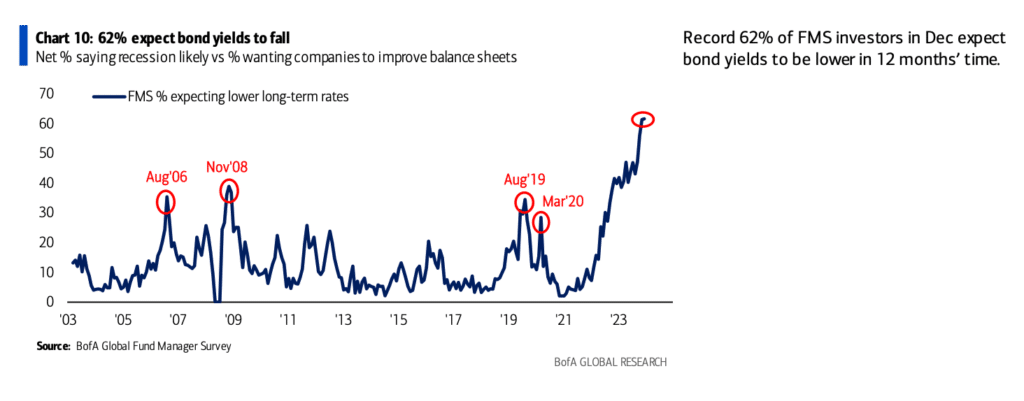–Record 62% of managers looked for lower bond yields in 2024
By Vicki Schmelzer
NEW YORK (MaceNews) – Global investors again put sidelined money to work in December, with allocation to stock and bonds increasing and cash levels falling, according to the findings of BofA Global Research’s monthly fund manager survey, released Tuesday.
Fund manager sentiment was the most upbeat since January 2022, with many managers seeing a “Goldilocks ‘24” scenario, the survey said.
Despite this optimism, views toward inflation and growth remained mixed.
In December, a net 75% of portfolio managers expected lower inflation in 2024, with a record 89% expecting lower short-term rates in the next 12 months. In November, a net 76% of those polled looked for lower global CPI in the coming year.
“Also note 91% of FMS investors think the Fed has finished its rate hiking cycle,” BofA Global said.
In addition, a record 62% of fund managers polled this month looked for bond yields to be lower in 12 months’ time.
This month, a net 50% of managers looked for weaker economic growth in the coming year, compared to a net 57% in November and back at October levels. These levels compare to July 2022, when at the peak of global growth concerns, a net 79%, a record high, were looking for weaker growth.
In December, 66% of managers looked for a “soft landing” for the global economy, versus a net 74% in November and a net 64% in October.
“When asked about the timing of recession for the U.S. economy, 36% said they expect no recession at all in the next 12 months while 32% expect the U.S. to fall into recession in Q2’24,” the survey said.
In December, cash levels again fell while allocation to stock and bonds increased and commodities decreased.
Average cash balances stood at 4.5% in December, compared to 4.7% in November and 5.3% in October.
Allocation to cash fell to a net 3% overweight in December, down from a net 18% overweight in November and a net 29% overweight in October. This was the “largest monthly decline in cash allocation” since the U.S. election in November 2020, the survey noted.
In December, a net 15% of portfolio managers were overweight global equities, compared to a net 2% overweight in November and a net 4% underweight in October.
This month, a net 20% of managers were overweight bonds, versus a net 19% overweight in November and a net 1% overweight in October.
Forty-five percent of those polled in December said “bonds” would be the best performing asset class in 2024, the survey said.
Commodity allocation fell to a 10% underweight this month from a net 3% overweight in November and compared to a net 8% overweight in October. The current underweight is the lowest since June 2017, the survey said.
On regional equity allocation, global investors reallocated holdings with eurozone, emerging markets and UK stocks benefiting at the U.S. and Japan’s expense.
Allocation to U.S. stocks stood at a net 9% overweight in December, compared to a net 11% overweight in November and a net 6% overweight in October.
This month, a net 9% of managers were underweight eurozone stocks, versus a net 23% underweight in November and a net 19% underweight in October.
Allocation to global emerging markets (GEM) rose to a net 1% overweight in December from a net 4% underweight in November and a net 3% underweight in October.
Allocation to Japanese equities stood at a net 12% overweight in December versus a net 23% overweight in November, while UK allocation held at a 22% underweight compared to a net 30% underweight in November.
In December, the biggest “tail risks” feared by portfolio managers were: “Global recession/hard landing” (32% of those polled), “High inflation keeps central banks hawkish” (27%), “Geopolitics worsen” (17%), “Systemic credit event (government/corporate)” (9%), “US election” (7%), and “China banking crisis” (4%)
In November, the biggest “tail risks” were: “Geopolitics worsen” (31% of those polled), “High inflation keeps central banks hawkish” (25%), “Global recession/hard landing” (23%), “Systemic credit event (global/corporate)” (14%), “AI/tech bubble” (4%) and China real estate bust (0%).
In December, the “most crowded” trades deemed by global managers were: “Long Magnificent Seven” (49% of those polled), “Short China equities” (22%), “Long Japan equities” (8%), “Long yield-curve steepeners” (6%), “Short REITS” (5%), and “Short 30-year Treasury” (3%).
Note: the term “Magnificent Seven” was coined by Bank of America’s chief investment strategist Michael Hartnett, referring to a basket of the seven major tech stocks: Apple, Microsoft, Amazon, NVIDIA, Alphabet, Tesla and Meta.
In November, the “most crowded” trades deemed by global managers were: “Long Big Tech” (38% of those polled), “Short China equities” (22%), “Long T-bills” (11%), “Short 30-year Treasury” (7%), “Short REITs” (6%) and “Long Japan equities” (6%).
An overall total of 254 panelists, with $691 billion in assets under management, participated in the BofA Global Research fund manager survey, taken December 8 to December 14, 2023. “219 participants with $611bn AUM responded to the Global FMS questions and 140 participants with $310bn AUM responded to the Regional FMS questions,” BofA Global said.
Contact this reporter: vicki@macenews.com
Stories may appear first on the Mace News premium service. For real-time email delivery contact tony@macenews.com.
Twitter headlines @macenewsmacro

